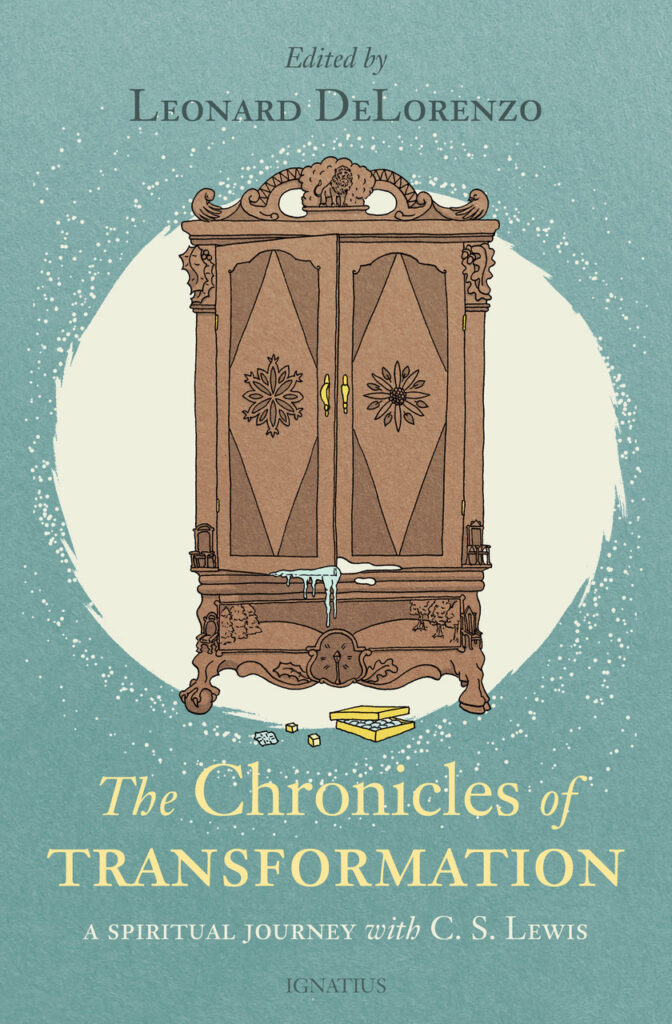
By Tim Walch
Book Review
A review of The Chronicles of Transformation: A Spiritual Journey with C.S. Lewis. Edited by Leonard J. DeLorenzo. Ignatius Press, 2022, 253 pp. $17.95

“The Chronicles of Narnia” — never has a beloved saga begun with such a modest idea. As author, C.S. Lewis repeated often, the Chronicles “all began with a picture of a faun carrying an umbrella and parcels in a snowy wood. This picture had been in my mind since I was about sixteen. Then one day, when I was about forty, I said to myself: ‘Let’s try to make a story about it.’”
And what a wonderful story it became! Since the first of seven books appeared in 1950, the Chronicles have become a masterpiece of children’s literature and sold more than 100 million copies in 47 languages. To this day, readers of all ages are swept up in an enchanting story of a mystical land full of adventure and courage as well as large doses of good and evil.
The Chronicles intrigue readers of all ages, including literary scholars and theologians. To provide a fresh perspective on this classic, Leonard J. DeLorenzo of the University of Notre Dame enlisted a group of notable scholars to reflect on the Christian message in each volume. The end result, as noted in the subtitle, is “ a spiritual journey with C.S. Lewis.”
DeLorenzo begins by mapping out Lewis’ modest intent for what would become the Chronicles. Lewis did not have a plan to write Christian stories — that theme interceded itself as he wrote — as if the hand of God were directing him on each page.
“The author’s initial intention,” notes DeLorenzo, “did not imprison his final purpose, so that by the time the last book in the series was published in 1956, Lewis had managed to create an adventure filled with beloved characters that did not tell children the truths of Christianity, but rather gave them images to show them true Christian beauty.”
Therein lies the genius of the Chronicles — each volume provides an exciting narrative with a higher purpose. Beginning with “The Lion, the Witch and the Wardrobe” and ending with “The Last Battle,” “children learn what it means to grow in maturity, to become responsible, and to develop character.”
It’s important to remember, however, that the Chronicles are more than children’s stories. They resonate with readers of any age who are open to seeing the world, once again, through the eyes of a child. “This includes adults who have been weighed down by life,” adds DeLorenzo, “and those who have become intellectually ‘puffed up’ or too spiritually sophisticated to immerse themselves easily in chronicles like these.”
DeLorenzo invites us to read each book with fresh eyes. He expresses a hope that these stories “will soften our defenses and open up space within our hearts and minds for welcoming the joy of Christ, in whom the drama of all life bursts forth.”
In his first letter to the Corinthians, St. Paul advises us to “put away childish things” once we reach adulthood. The Chronicles, however, should be an exception to that admonition. In fact, were he with us today, St. Paul might even enjoy the world of C.S. Lewis!
Consider rereading the Chronicles and, in the process, use this collection of essays, poems and illustrations as a guide. The wonder of Narnia waits to be rediscovered.
(Timothy Walch is a lay director at St. Thomas More Parish in Coralville and member of The Catholic Messenger’s board of directors. He regularly reviews books for the Messenger and other publications and is the author of many books including “Irish Iowa” (2019).)











